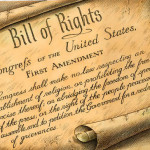Events in the last few weeks in the United States may mark a turning point for religious freedom in the world.
Enshrined in the First Amendment of the Constitution are these words:
 Congress shall make no law respecting an establishment of religion, or prohibiting the free exercise thereof; or abridging the freedom of speech, or of the press; or the right of the people peaceably to assemble, and to petition the Government for a redress of grievances.
Congress shall make no law respecting an establishment of religion, or prohibiting the free exercise thereof; or abridging the freedom of speech, or of the press; or the right of the people peaceably to assemble, and to petition the Government for a redress of grievances.
This limitation on government perhaps marks the high water mark in mankind’s struggle for freedom. Popularly summarized as “religious freedom,” it actually enshrines the concept of the freedom of consciences as expressed in:
- Freedom of religion
- Freedom of speech
- Freedom of press
- Freedom of assembly
- Freedom of redress from the government
The freedom of conscience is perhaps the first freedom that all others are founded upon.
The state of Indiana’s passage of the Religious Freedom Restoration Act – RFRA, is the latest flash point in an ongoing debate that is ripping the country apart. Very simply the two sides of the debate (Is it too much to say “mortal combat”?) represent two dramatically different opinions and two radically different visions of the future of the nation.
The First Amendment enshrines freedom of religion and freedom of conscience.
On one side are those who insist on a fundamental “right”[1] to define their own sexual identity. On the other side, those who point to the First Amendment to the Constitution of the United States which enshrines freedom of religion and freedom of conscience.
Certainly the culture has already shifted on this issue and that is why the dominoes are falling so quickly in terms of changing laws and government policy. To say it simply, the right to sexual self-definition is currently trumping the First Amendment.
Today we are fighting the battles over government policy. But the debate began at the level of principle. In 1992, Justice Kennedy, writing for the majority in Planned Parenthood vs Casey, said a fundamental principle of our liberty was “the right to define one’s own concept of existence, of meaning, of the universe, and of the mystery of human life.” This phrase brought a new “principle,” the right of each individual to define, not only oneself, but even the nature of human life!
Where did this new principle come from? It was born out of the new paradigm of Darwinian ideology. In the West, Judeo-Christian theism was abandoned. Theism affirmed the existence of God and of an objective universe, where certain laws exist and certain things are fixed. The modern universe, stripped of transcendence, had no place for man as the image bearer of God. Man was reduced to an animal, a machine. Moral and metaphysical absolutes were exchanged for moral and metaphysical relativism. Man became god with the privilege of defining himself. Jeremy Rifkin exactly captures today’s context:
We no longer feel ourselves to be guests in someone else’s home and therefore obliged to make our behavior conform with a set of pre-existing cosmic rules. It is our creation now. We make the rules. We establish the parameters of reality. We create the world, and because we do, we no longer feel beholden to outside forces. We no longer have to justify our behavior, for we are now the architects of the universe. We are responsible to nothing outside ourselves, for we are the kingdom, the power, and the glory forever and ever.
Michael Brown has his Ph.D. in Near Eastern Languages and Literatures from New York University. Brown is a popular author (of 25 books) and host of the radio show, “Line of Fire.” He opines about the public’s reaction over the events of the last few weeks and the continued erosion of religious freedom in the United States.
I am so deeply grieved over what I have witnessed this week in Indiana, Arkansas, and Georgia, as governors and legislators suddenly caved the moment the threats and shouts came their way.
Where are the men and women of moral principle and courage? Where are those who will stand up for what is right because it is right? The words of Dr. King call out to us again today:
“Cowardice asks the question, is it safe? Expediency asks the question, is it politic? Vanity asks the question, is it popular? But conscience asks the question, is it right? And there comes a time when one must take a position that is neither safe, nor politic, nor popular; but one must take it because it is right.”
Oh for God’s people to awake to righteousness! Oh for God to raise up leaders with courage and conviction! Oh for men and women with backbones of steel and hearts of compassion! Pray that you and I would be among them, to the glory of Jesus’ name and for the sake of this dying world.
I was moved by Brown’s words and passion. Read his entire post here.
Dr King’s quote challenged me. It comes from a speech protesting the Vietnamese War. Whether or not you agree with King’s position, his challenge to be people of principle and courage is vital. King’s principles propelled him to lead the civil rights movement which fundamentally transformed the United States. For his courage he paid the ultimate price: he was assassinated on April 4, 1968.
– Darrow Miller
… to be continued
[1] I have put the word “right” in quotations to reflect that this is a so-called right rather than a fundamental right of all people. Obviously those who support the position of sexual self-definition would consider this a fundamental right.






2 Comments
Jon
May 1, 2015 - 3:19 pmAmen.